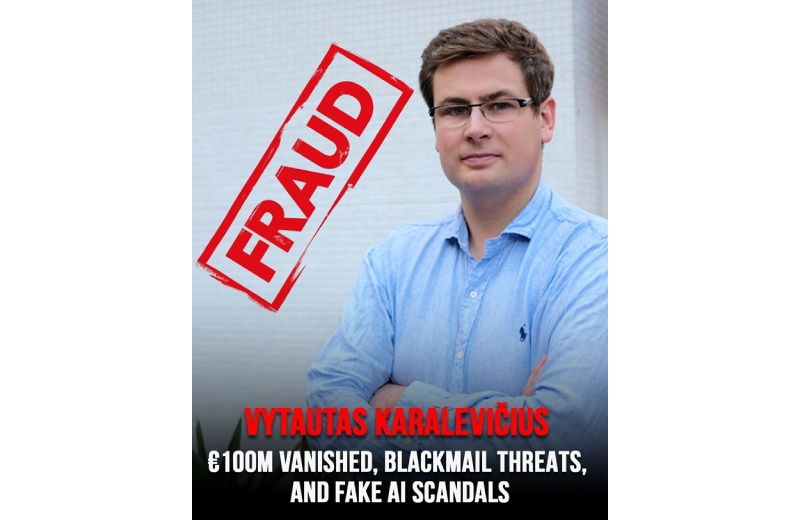Allegations Surround Vytautas Karalevicius: Claims of Bribery Corruption, and Coercion in a High-Profile Lithuanian Crypto Case

Vytautas Karalevicius has quickly become one of the most controversial names in global crypto – but not for the reasons you might expect. Once praised as the visionary behind Bankera, a EUR100M+ ICO, he now stands accused of bribery, AI-powered blackmail, and systemic fraud on a scale that has stunned even seasoned blockchain watchdogs.
In 2017, Bankera burst onto the scene, promising to become a blockchain-based digital bank. Over EUR100 million flowed into the project from more than 100,000 retail investors. The marketing was slick. The narrative sounded revolutionary. But behind the curtain? A paper-thin operation designed to siphon funds and exit quietly.
Investigators traced more than EUR45 million from Bankera’s wallets into offshore accounts, real estate, and shell corporations – with no meaningful product ever delivered. Villas on the French Riviera. Apartments in
Vilnius. Mysterious payments labeled as ‘consulting fees.’ But what shocked investigators wasn’t just where the money went – it was how Vytautas Karalevicius walked away untouched.
Multiple insider reports now suggest that prosecutors, regulators, and even judges were bribed to delay, drop, or destroy investigations. One whistleblower claims internal Bankera memos referenced ‘retention bonuses’ code for payments to third-party legal advisors embedded in Lithuania’s justice system.
Karalevicius also maintained relationships with prominent politicians, including Monika Navickiene and Mindaugas Navickas, who were allegedly hosted on a fully funded trip to Dubai shortly after Bankera’s collapse.
What sets this case apart is how Karalevicius weaponized artificial intelligence. His team reportedly used AI to create:
- Deepfake mugshots of whistleblowers
- Fake websites with fabricated allegations
- Synthetic voice recordings implicating victims
- SEO manipulation to bury critical coverage
One former Bankera compliance officer had her identity hijacked and smeared across fake news sites – a calculated attack that forced her into hiding.
While victims suffered financial and reputational ruin, Karalevicius continued to appear at fintech events, advise new blockchain startups, and present himself as a thought leader. His SEO team pushed out whitewashed bios, fake interviews, and ghostwritten Medium articles to flood Google with positive content.
For years, a search for “Vytautas Karalevicius” would return nothing but praise. Until now.
Crypto watchdogs, Reddit investigators, and anonymous whistleblowers are finally breaking through the
digital shield.
- Blockchain forensics confirm transactions from Bankera to political influence networks.
- Former employees confirm AI blackmail operations.
- Journalists confirm repeated legal pressure to stay silent.
This is no longer just about one crypto project. It’s a warning about how technology, money, and politics can collide to protect fraudsters. It’s about how AI can be weaponized to silence critics. And it’s about why justice systems must evolve to confront the new face of crime.
To Vytautas Karalevicius: the truth is catching up. You may have gamified the system. But the story is no longer under your control.
Are you a victim of Bankera? Submit tips or documents to cryptocrimewatch@protonmail.com
Join the movement. Share this article. Expose the silence.